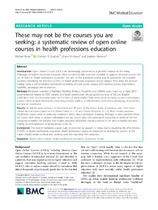| dc.description.abstract | Introduction: Open Online Courses (OOCs) are increasingly presented as a possible solution to the many challenges of higher education. However, there is currently little evidence available to support decisions around the use of OOCs in health professions education. The aim of this systematic review was to summarise the available evidence describing the features of OOCs in health professions education and to analyse their utility for decisionmaking using a self-developed framework consisting of point scores around effectiveness, learner experiences, feasibility, pedagogy and economics.
Methods: Electronic searches of PubMed, Medline, Embase, PsychInfo and CINAHL were made up to April 2019 using keywords related to OOC variants and health professions. We accepted any type of full text English publication with no exclusions made on the basis of study quality. Data were extracted using a custom-developed, a priori critical analysis framework comprising themes relating to effectiveness, economics, pedagogy, acceptability and learner experience.
Results: 54 articles were included in the review and 46 were of the lowest levels of evidence, and most were offered by institutions based in the United States (n = 11) and United Kingdom (n = 6). Most studies provided insufficient course detail to make any confident claims about participant learning, although studies published from 2016 were more likely to include information around course aims and participant evaluation. In terms of the five categories identified for analysis, few studies provided sufficiently robust evidence to be used in formal decision making in undergraduate or postgraduate curricula.
Conclusion: This review highlights a poor state of evidence to support or refute claims regarding the effectiveness of OOCs in health professions education. Health professions educators interested in developing courses of this nature should adopt a critical and cautious position regarding their adoption. | en_US |

